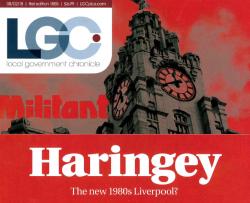This week’s edition of the Local Government Chronicle has a feature article, written by the editor, entitled Momentum in Haringey: the new Militant in Liverpool? It is very pertinent that this magazine chooses this time to draw a parallel to the 1980s.
Momentum, of course, is not Militant and is never likely to be. The Militant newspaper represented a clear and well-defined political tradition that had been established through rank and file Labour Party members over several decades and which united more or less all of its readership and supporters. Momentum, on the other hand, is effectively the ‘property’ of a single person and it has no political line to speak of, other than a vague and generalised support for Jeremy Corbyn. Although Momentum has campaigned both inside and outside the Labour Party on a pro-Corbyn platform, there is growing dissonance between local Momentum groups and the national owners. In the case of Calder Valley CLP, for example, national Momentum backed an Owen Smith supporter against a local left candidate for the parliamentary nomination, much to the annoyance of local Momentum members.
What Militant and Momentum do have in common is a relentless demonization by the national press, with lurid (and entirely made-up) tales of ‘intimidation’ and ‘bullying’ re-cycled from the 1980s to the present day. Many established local Labour right-wing worthies, either MPs or councillors, have grown so used to being treated deferentially by a tame Party rank and file that anyone who has the temerity to criticise them – much less vote against them! – is, by definition, a ‘bully’. Thus, criticism becomes ‘bullying’ and voting against them becomes ‘intimidation’, and so it goes.
As one would expect, the tenor of the article in the Local Government Chronicle is defensive of the former leadership of Haringey council and critical of the current national Labour leadership, on the grounds that Labour councillors ought “to do more with less” because of Government cuts. The magazine is particularly critical of Labour’s NEC for opposing Haringey Council’s £2bn public-private partnership, the Haringey Development Vehicle. The editor complains that Jeremy Corbyn is no Neil Kinnock. In the event of a radical Momentum-led council in Haringey, the editor says, “it could be led by a Derek Hatton unrestrained by Labour centrally”. This would be uncomfortable, it goes on, “for Labour councillors across the country who have built their careers on the necessity of pragmatism…”
This really is why the Local Government Chronicle is choosing this moment to raise the issue of Liverpool City council: because there is a perceptible head of steam building up in the Labour Party and the trades unions against Labour councillors meekly accepting cuts imposed by the Tory Government, without any opposition being evident. At the Labour Party conference last year, Howard Beckett, the assistant general secretary of Unite put it very well, when he spoke about the bin dispute on Birmingham council. “It is not good enough,” he said, “for Labour councillors to hide behind talk of Tory budgets…it is not good enough for them to talk of hard decisions – that has no place in a socialist party.”
We agree entirely with that. In a previous editorial, we commented on the fight put up against Tory cuts by Liverpool City council in the 1980s. (http://www.left-horizons.co.uk/index.php?section=1&page=193” “Rather than lead a ‘token’ opposition behind closed doors,” we wrote, “the Liverpool councillors took their case to the broad labour movement across the whole city. Workplace meetings, factory meetings and community meetings were held by the hundred. Literally thousands were involved in discussions and meetings and there was not a single person in the City who did not understand the situation that the Tories had put Liverpool in”.
This is the pertinent point. Too many Labour councillors have no engagement whatsoever with the local labour movement, or for that matter with the local communities, about the cuts they carry out. Too many are afraid of rocking their personal boats – their “careers” as the editor of the Local Government Chronicle put it – and are therefore happy to vote on cuts behind closed doors. Unless and until these Labour councillors are going to the labour movement: to Labour Party branches, to trade union branches (especially local authority unions) and to communities, to discuss some kind of campaign of opposition and resistance, then they have no claim to be opposing Tory cuts. Wringing hands in private meetings is no opposition at all.
A key question, of course, is what kind of opposition can be offered. There are many sincere Labour Party members who have found themselves elected as councillors, but who are unable to see a way out of their situation. They may well feel ‘trapped’ by older and more senior councillors who run a regime within the Labour Group which is as strict and disciplined as it is secret and hidden from the outside labour movement. This is where the national leadership of the Labour Party must come in. The NEC, correctly, took a position of condemning the public/private partnership in Haringey. But it must also take up a position and give a lead to Labour councillors up and down the country who are facing impossible cuts to public services and jobs.
Local government finances are in such a parlous state now that even Tory councils are beginning to protest. Northants County Council has issued a section 114 notice, which means that it cannot guarantee to provide any services other than those that are statutory. According to the Chartered Institute of Public Finance and Accountancy, an additional “half a dozen” councils are in the same boat and are only a year away, at most, of “going bust”. Councils across the country are rapidly depleting their financial reserves to stay afloat. The Government might find some sweeteners for the county councils, which are mostly Conservative-controlled, but they have no intention of relieving the massive financial pressure on local authorities in general. The Tories will continue to sit on their hands while many of the functions of local authorities – the fire service, education, social care, housing, etc, etc – go to the wall.
It is in this dire scenario that Labour councillors are having to face up to cuts far greater even than those they have nodded through in recent years. Last week, John McDonnell, the Shadow Chancellor, made the comment that Labour councils were being used as ‘human shields’ by the Tory Government. That is a useful metaphor, but it is also limited one. It is time for the Labour leadership to go beyond criticism of the Government. We repeat what we said in our earlier comment on this issue: it is time for the Party leadershipto place itself in the direct forefront of a fight against cuts.
Jeremy Corbyn, John McDonnell and the NEC should call a special Party conference, with delegates from Labour authorities, CLPs and trade unions, to demonstrate national opposition to Tory cuts. In the 1980s, before Liverpool council was eventually left to fight on alone, it looked at one point as if half a dozen big Labour authorities were set to defy the Thatcher Government. That was against the wishes of a then right-wing Labour leadership. Had that large-scale opposition gone ahead, it would have brought the Tory Government to its knees.
The case for a national and concerted opposition today is even more stark. If even a few big local Labour authorities, especially from city councils Like Newcastle, Liverpool, Manchester and Sheffield – were to throw down challenge to the Tories, defying the legal norms of a ‘balanced’ budget and demanding proper finances, then it would change the whole political landscape immeasurably. The Tory Government is hopelessly trapped at the moment in a downward spiral of confusion and delusion over Brexit. A massive revolt by local authorities up and down the country would be the coup de grace for the Tories, who would not last a week in power. But the lead must be set from the top. Over to you, John and Jeremy. Labour councillors need a national lead.
February 12, 2018



